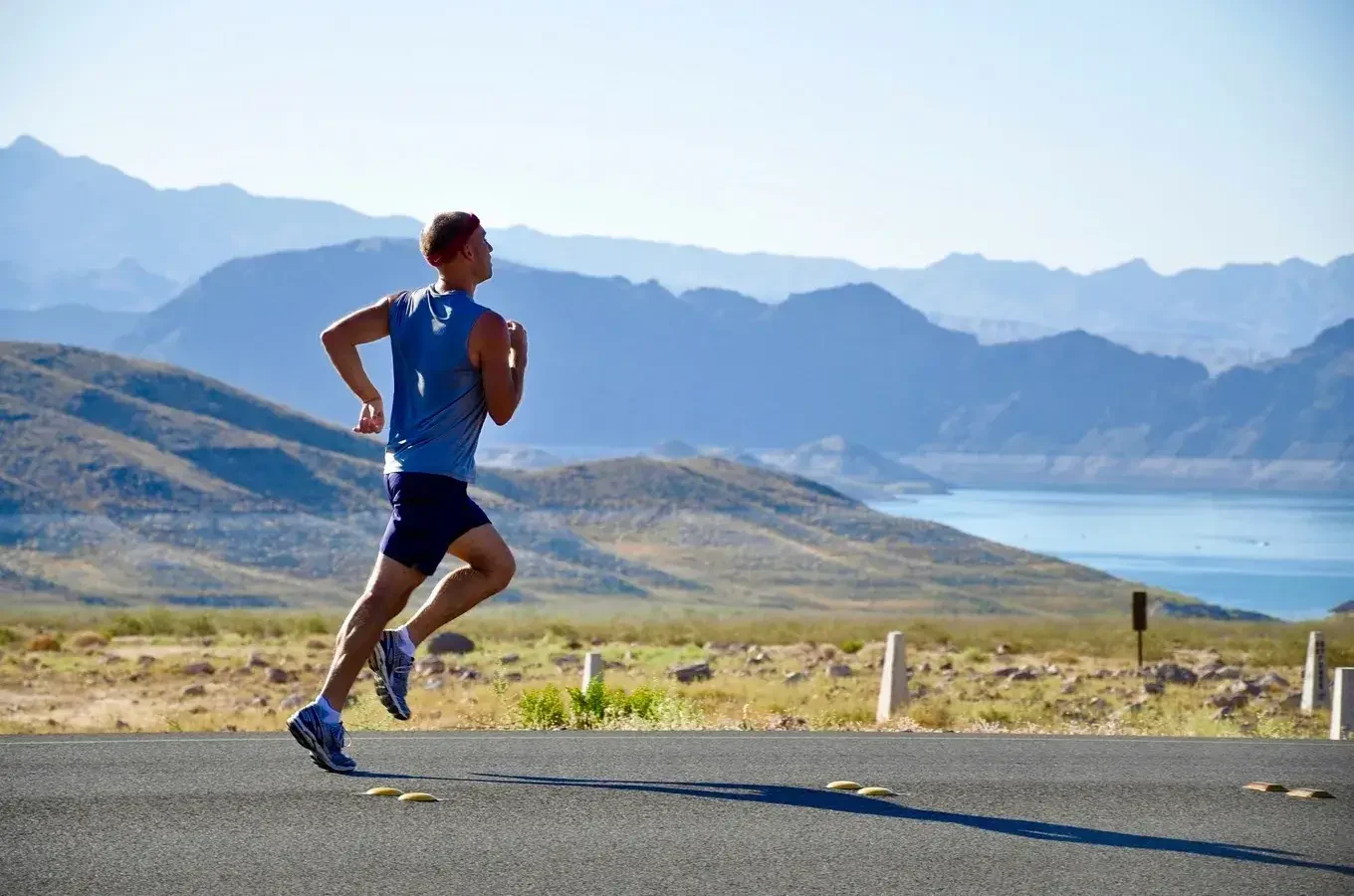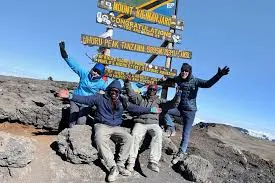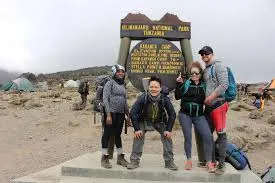Health Tips for Kilimanjaro Climbers: Staying Fit and Safe
Climbing Kilimanjaro is as much about preparation as it is about determination. To stay fit and safe, train your body with regular cardio and strength workouts, and practice hiking with a loaded backpack. On the mountain, pace yourself—pole pole (slowly, slowly) is the golden rule. Stay hydrated, eat well to keep your energy up, and don’t ignore signs of altitude sickness. Good sleep, proper layering for warmth, and listening to your guides will go a long way in keeping you healthy all the way to the summit.From fitness training and nutrition to hydration and vaccinations, our expert guide equips you to conquer Kilimanjaro’s 5,895m summit while staying healthy and strong.
Plan Your Kilimanjaro Trek Now
Why Health Preparation is Crucial for Kilimanjaro
Health preparation is crucial for Kilimanjaro because the trek pushes your body to high altitudes, colder temperatures, and long days of hiking. Proper training, nutrition, and acclimatization reduce risks like altitude sickness and fatigue, giving you the best chance of reaching the summit safely and enjoying the climb. Capable Africa Tours emphasizes preparation to prevent altitude sickness, injuries, and fatigue. Below, we outline fitness routines, altitude strategies, nutrition, and safety measures to ensure a successful climb.
Fitness Training for Kilimanjaro
Start training 3–6 months before your climb to build endurance, strength, and stamina. Aim for 3–5 weekly workouts, including:
- Cardiovascular Exercise: 45–60 minutes of hiking, running, or cycling to improve aerobic capacity.
- Strength Training: Squats, lunges, and core exercises (planks, Russian twists) to strengthen legs and core.
- Practice Hikes: Weekly hikes (4–6 hours) with a 10–15kg backpack to mimic trek conditions.
- Stair Climbing: 30–60 minutes to prepare for steep ascents like the Barranco Wall.
Data from Capable Africa Tours shows that 95% of climbers who trained consistently for 4+ months summited successfully, compared to 70% for those with minimal preparation.
Altitude Sickness Prevention
Altitude sickness (AMS) affects 50–75% of Kilimanjaro climbers due to low oxygen at high altitudes. Symptoms include headaches, nausea, and dizziness. Capable Africa Tours recommends:
| Strategy | Description | Effectiveness |
|---|---|---|
| Longer Routes | Choose 7–9 day routes (e.g., Lemosho, Machame) for gradual acclimatization. | Reduces AMS risk by 20–30%. |
| Hydration | Drink 3–4 liters of water daily using a hydration bladder or bottles. | Decreases AMS symptoms by 15–20%. |
| Pole-Pole Pace | Walk slowly (“pole-pole” in Swahili) to conserve energy and oxygen. | Improves summit success by 25%. |
| Diamox | Consider Diamox (125–250mg daily, consult a doctor) to aid acclimatization. | Reduces AMS incidence by 10–25%. |
Nutrition and Hydration Guide
Proper nutrition fuels your climb and aids recovery. Capable Africa Tours provides balanced meals, but personal preparation is key:
- Pre-Climb Diet: 2–3 months before, eat carbs (60%), proteins (20%), and fats (20%)—e.g., whole grains, lean meats, avocados.
- During Trek: Pack high-energy snacks (nuts, dried fruits, energy bars). Consume 3,000–4,000 calories daily to combat altitude-related appetite loss.
- Hydration: Drink 3–4 liters daily. Use water purification tablets or filters (e.g., LifeStraw) for safety.
Vaccinations and Medical Checks
Before climbing, consult your doctor 6–8 weeks prior for:
- Vaccinations: Yellow Fever (required for Tanzania), Typhoid, Hepatitis A, Tetanus.
- Medical Checkup: Assess heart, lung, and fitness levels to ensure you’re trek-ready.
- Medications: Carry personal prescriptions, plus ibuprofen, anti-diarrhea pills, and Diamox (if prescribed).
Safety Gear Checklist
| Item | Quantity | Purpose | Weight (Approx.) |
|---|---|---|---|
| Hydration Bladder | 1 (2–3L) | Easy water access | 200–300g |
| Water Purification Tablets | 50–60 | Safe drinking water | 50g |
| First Aid Kit | 1 | Minor injuries, blisters | 200–400g |
| Headlamp | 1 | Night trekking (summit) | 100–150g |
| Sunscreen (SPF 50+) | 1–2 tubes | UV protection | 100–200g |
Why Health Matters for Kilimanjaro Success
Health matters for Kilimanjaro success because your body is the engine that gets you to the summit. Good fitness, proper acclimatization, and smart preparation reduce risks like altitude sickness and fatigue, giving you the strength and stamina to enjoy the climb safely and reach your goal. Here’s why health preparation directly impacts your summit success:
- Endurance: Strong cardio and leg strength handle 40–60km of trekking.
- Altitude Resilience: Gradual ascent and hydration reduce AMS risk.
- Injury Prevention: Proper boots and training minimize blisters and sprains.
- Mental Stamina: A fit body boosts confidence for summit night’s 8–10-hour climb.
Watch Our Kilimanjaro Health Preparation Guide
See how Capable Africa Tours prepares climbers with health and fitness tips for a safe, successful Kilimanjaro ascent.
Top Health Tips for Kilimanjaro Climbers
To stay healthy while climbing Kilimanjaro, pace yourself and allow time for proper acclimatization to reduce the risk of altitude sickness. Prioritize sleep and recovery by keeping a steady routine and staying warm at night. Maintain good hygiene by sanitizing hands regularly and following safe food and water practices. Protect your skin and eyes from intense UV exposure with sunscreen, lip balm, and sunglasses. Below is a set of top health tips every climber should follow to stay safe and strong throughout the 6–9 day trek with Capable Africa Tours.
- Train Early: Begin cardio and strength training 3–6 months prior to build stamina.
- Simulate Conditions: Practice hikes with a weighted pack to prepare for 10–15kg loads.
- Hydrate Consistently: Drink 3–4 liters daily and use purified water to avoid illness.
- Monitor AMS Symptoms: Report headaches or nausea to guides immediately for early intervention.
- Eat Smart: Pack calorie-dense snacks and eat provided meals to maintain energy.
- Protect Skin: Apply SPF 50+ sunscreen and wear UV-protective clothing to prevent burns.
- Rest Well: Sleep 7–8 hours nightly before the trek to boost recovery and focus.
- Follow Guides: Trust Capable Africa Tours’ experienced guides for pacing and safety checks.
Ready to Summit Kilimanjaro Safely?
Join Capable Africa Tours for a safe, unforgettable Kilimanjaro climb. Our expert guides, health-focused itineraries, and 98% summit success rate ensure you’re fit, safe, and ready to conquer 5,895m.
- Daily health checks by certified guides
- Nutritious meals tailored for high-altitude trekking
- Longer routes for better acclimatization
- Gear rentals for essential safety equipment
- Eco-friendly treks supporting local Tanzanian communities
Limited spots for Kilimanjaro treks—book now to secure your healthy, safe adventure!
Plan Your Trek Now


